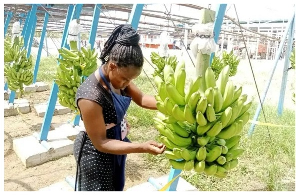Business News of Thursday, 9 May 2024
Source: thebftonline.com
We lost over €1.8 million from Akosombo Dam spillage - GEL
Golden Exotic Limited (GEL), a leading exporter of fresh bananas to the European Union (EU) market, has disclosed that damages to its farms caused by the Akosombo Dam spillage-induced flood exceed €1.825million.
Recalling its losses at sites near the Volta River basin since October 2023 when the floods began, the company revealed that the flood damage to crops, machinery, infrastructure and others totalled €1.825million.
A visit to the site revealed the scope of damage, with an entire farm-growing area completely submerged. This includes significant losses to their specialty exotic breed banana plantation, irrigation systems, equipment, roads and other infrastructure investments, all of which have been significantly damaged, requiring extensive reinvestment for repairs.
Corporate Affairs and Administration Manager, GEL, Mark Angel, explained that banana is usually suited for rainforest vegetation. But because the Asutuare area’s vegetation is savanna, the farm is 100 percent irrigated. This requires huge investment in machinery and irrigation technology, much of which has also been damaged by the flood.
GEL holds a 90 percent market share for fresh banana fruits exports from Ghana to the EU, with over 100,000 tonnes of export per annum.
“The farm estimates total losses exceeding €1.825million as a result of damage to crops, equipment and infrastructure. This has been an extremely challenging time for our farm; the scope of the flooding has been devastating, with some new plantation sites completely submerged,” he said.
He made this known during a facility tour visit by the UK-Ghana Chamber of Commerce in partnership with the Institute of Financial and Economic Journalists (IFEJ) to commemorate the World Press Freedom Day.
Unfulfilled promises
While the farm management is working tirelessly to salvage the situation internally and recover lost investments, the government’s promised relief and recovery support – which is crucial for a company providing jobs to over 4,000 Ghanaians – is yet to materialise.
Although there has been engagement between the company and the government regarding the extent of damage, the promise to assist the company in recovering its losses has not been fulfilled, Mr. Angel added.
GEL farms are renowned for their commitment to sustainable practices and community involvement. In addition to creating 4,000 jobs, with about 97 percent filled by locals from adjacent communities, the company has invested millions of cedis in corporate social responsibility (CSR) initiatives. These include providing education and health facilities, potable water, energy and infrastructure support to health workers and teaching staff, among others.
Notable among these projects is the refurbishment and upgrade of the health centre in Asutuare to the Shai Osudoku District Health Directorate, which serves more than 20,000 residents of the area; a six-unit classroom block at Lubuse Roman Catholic (RC) Basic School; and two 120 units residential facilities for teachers and nurses in Dorfor and Adakope respectively. Other projects include water supply systems through mechanised boreholes in about four different communities.
With all these contributions to communities’ development coupled with the huge taxes it pays to the government as an import substitution entity, it is important for the government to fulfil its promise and support to ensure the company is operating at full capacity.
Akosombo Dam spillage
In October 2023, the Volta River Authority (VRA) initiated a controlled release of water from the Akosombo Dam. This measure was taken to safeguard the dam from potential overtopping. The increased water flow in the Volta River has, unfortunately, led to flooding in low-lying areas along its course, impacting communities such as Mepe, Battor, Sogakope, Mafi, Adidome and others.
At the peak of the disaster, the National Disaster Management Organization (NADMO) in Ghana indicated that more than 26,000 individuals were displaced by these floods, resulting in the loss of homes, possessions and livelihoods.
Additionally, the floods have left a trail of damage, affected infrastructure and caused widespread damage to roads, bridges, and educational facilities. The environmental impacts are substantial – agricultural lands have been inundated, leading to the destruction of crops and livestock.











